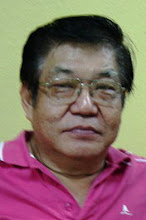 Append below more information from internet search on the nutritional values of mangosteen:
Append below more information from internet search on the nutritional values of mangosteen:The mangosteen pericarp, about a half-centimeter thick, is green when unripe, then dark purple when ripe. That’s why it is also called “The Purple Mangosteen”.
When we eat mangosteen, we hold the fruit in both hands. The mangosteen pericarp looks tough and hardy, but is quite easy to open. What we do is using our thumbs to press on it gently and twist a little bit with our left hand turning anti-clockwise and our right hand turning clockwise until the pericarp cracks into two halves exposing the edible white flashy pulp which is sweet, juicy and delicious in taste. After eating, we will spit out the seeds and throw away the inedible pericarp without knowing that it is of highly nutritional values and benefits.
Accordingly, Asian Health Practitioners have long made use of mangosteen pericarp for a myriad of nutritional uses. The Southeast Asian people have been using the mangosteen fruit, especially the pericarp, to treat infections, reduce pain or control fever, and also treat various other illness and sickness.
Not surprisingly, dried mangosteen fruits have been shipped from Singapore to Calcutta and to China for medicinal use. The sliced and dried mangosteen pericarp, available in most Chinese drug stores, is powdered and administered to overcome dysentery. Made into an ointment, it is applied on eczema and other skin disorders.
It seems that mangosteen pericarp can absorb fats. Yesterday after a morning walk on part of golf course in Segamat Country Club, we sat down at the club house to chat while reading the newspaper. A Mr. Seow told us that his mum used to cook meat soup for her children and normally it turned out to be quite oily on the top layer of the boiled soup. When she added a few slices of mangosteen pericarp, somehow the meat soup was less oily as if the top layer of fat had been absorbed. He also said that boiling the mangosteen pericarp in water and then drink it would help to relief diarrheas and lower cholesterol.
As reported, the medicinal properties of the mangosteen fruit are derived mainly from its pericarp where powerful antioxidants (xanthones) are highly concentrated. The pericarp also contains a large number of biologically active substances, such as that of vitamins, catechins, polysaccharides, and stilbenes.
We have read that the presence of free radicals in our bodies has become the greatest threat to our overall health. They are able to attack each cell in the human body thousands of times per day, weakening it and making it susceptible to sickness and disease. Nevertheless, the rich antioxidants (xanthones) in the mangosteen pericarp, when consumed in the form of whole fruit mangosteen juice, are able to scavenge and neutralize the free radicals throughout our bodies. Apparently, it is highly effective in boosting weak immune systems.
[For information on original whole fruit mangosteen juice, click and visit http://www.myxango.com.my/jamesloh]





No comments:
Post a Comment